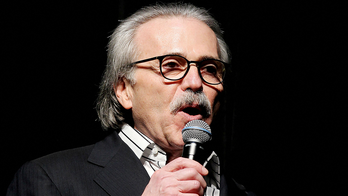President Obama called retiring Supreme Court Justice John Paul Stevens an "impartial guardian of the law" who is leaving at the "top of his game," as the president lays plans to quickly replace him.
Obama said the 89-year-old Stevens, the court's oldest member and leader of its liberal bloc, was a "brilliant" jurist who had "worn the judicial robe with honor and humility."
Stevens was appointed by President Gerald Ford in the months after the Watergate scandal. His decision to step down from the high court bench gives Obama the second Supreme Court appointment of his term.
In a letter to the president, Stevens, the longest active serving member, said he has "concluded that it would be in the best interests of the court to have my successor appointed and confirmed well in advance of the commencement of the court's next term" in October.
Stevens said he will step down when the court finishes its work for the summer in late June or early July.
White House Counsel Bob Bauer informed Obama of Stevens' decision by phone Friday morning as the president was flying back to Washington.
Obama said he will move quickly to name a nominee, as he did with Justice Sonia Sotomayor last year, and that he'll look for someone with similar qualities -- independent mind, fierce dedication to the rule of law.
In a written statement, Chief Justice John Roberts said Stevens "has earned the gratitude and admiration of the American people for his nearly 40 years of distinguished service to the Judiciary, including more than 34 years on the Supreme Court."
"He has enriched the lives of everyone at the Court through his intellect, independence, and warm grace. We will miss John's presence in our daily work, but will take joy in his and Maryan's continued friendship in the years ahead," Roberts said, referring to Stevens' wife.
Stevens' announcement Friday in Washington had been hinted at for months. It comes 11 days before his 90th birthday.
Stevens began signaling a possible retirement last summer when he hired just one of his usual complement of four law clerks for the next court term. He acknowledged in several interviews that he was contemplating stepping down and would certainly do so during Obama's presidency.
The timing of his announcement leaves ample time for the White House to settle on a successor and Senate Democrats, who control 59 votes, to conduct confirmation hearings and a vote. Republicans have not ruled out an attempt to delay confirmation.
The leading candidates to replace Stevens are Solicitor General Elena Kagan, 49, and federal appellate Judges Merrick Garland, 57, and Diane Wood, 59.
In a Fox News opinion poll this week, 52 percent of respondents said Obama's next Supreme Court nominee should be a conservative compared with 29 percent favoring a liberal.
Sen. Patrick Leahy, D-Vt., chairman of the Judiciary Committee, told The Associated Press that midsummer hearings will offer the best chance to avoid partisan fighting over Stevens' replacement.
In a written statement, he said he hopes the upcoming confirmation battle will produce a "thoughtful and civil discourse."
"The decisions of the Supreme Court are often made by only five individuals, but they impact the daily lives of each and every American," he said in a written statement. "All senators should strive to fulfill their constitutional duty of advise and consent, and give fair and thorough consideration to Justice Stevens' successor."
Sen. Orrin Hatch, R-Utah, a member of the Judiciary Committee, said the president "has an obligation to nominate judges who understand and are committed to their proper role in our system of government."
"As I have said for many years, someone who would be an activist judge, who would substitute their own views for what the law requires, is not qualified to serve on the federal bench," he said in a written statement. "The confirmation process should be fair and thorough, and the president's nominee should be judged by this standard."
Stevens' departure will not change the court's conservative-liberal split because Obama is certain to name a liberal-leaning replacement. But the new justice is not likely to be able to match Stevens' ability to marshal narrow majorities in big cases.
Stevens was able to draw the support of the court's swing votes, now-retired Justice Sandra Day O'Connor and Justice Anthony Kennedy, to rein in or block some Bush administration policies, including the detention of suspected terrorists following the Sept. 11, 2001, attacks, its tilt toward protecting businesses from some lawsuits and its refusal to act against global warming.
Stevens has been on the bench longer than any other current member of the Supreme Court and was a federal appellate judge in Chicago in 1975 when President Gerald Ford picked him for the high court.
Stevens impact in the bench was immediate as his vote helped forge a narrow majority to reinstate the death penalty. But by 2008, Stevens concluded the way capital punishment was carried out by states was pointless and "patently excessive and cruel and unusual punishment."
It was "a conclusion that the stable ground that he thought he found early on wasn't proving as stable as he would have liked," Stewart Baker, a former Stevens law clerk told Fox News.
Stevens took issue with being labeled a liberal justice. In recent years, Stevens maintained that his conservative principles never changed during his time on the court. Rather it was the justices around him and perhaps the country too that became more conservative than him.
Click here to read Fox News blog on the next Supreme Court nominee.
Fox News' James Rosen, Lee Ross and The Associated Press contributed to this report.




